|
|
|
Sort Order |
|
|
|
Items / Page
|
|
|
|
|
|
|
| Srl | Item |
| 1 |
ID:
144914
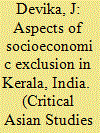

|
|
|
|
|
| Summary/Abstract |
This article probes the intersection of spatial, caste, and gender axes of power in shaping contemporary inequalities in Kerala, through mixed-method research in an urban slum. Relying largely on qualitative data, it constructs a history of work in the slum for lower caste men and women against the backdrop of Kerala politics from the 1940s until the present. It examines the role of widening gender gaps, the persistence of secularized caste, and flagging working-class politics and discourse in shaping contemporary socioeconomic exclusion in urban areas.
|
|
|
|
|
|
|
|
|
|
|
|
|
|
|
|
| 2 |
ID:
098266
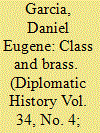

|
|
|
| 3 |
ID:
181142
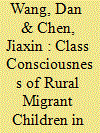

|
|
|
|
|
| Summary/Abstract |
The state of class consciousness of working-class children in China has received scant attention in the scholarly literature. This study examines the class consciousness of rural migrant children as they are about to join their migrant parents and become “China's new workers.” Qualitative investigations were conducted in two primary schools in Beijing. Focus group and individual interviews were held with 87 fifth- and sixth-grade migrant children in the two case schools and 324 valid student questionnaires were collected. The findings reveal that migrant children are aware of the unequal class relationships suffered by migrant workers; however, their interpretations of class-based injustices exhibit false consciousness, shadowed by individualism, meritocracy and the duality of images. Family and school may play vital roles in shaping migrant children's class consciousness.
|
|
|
|
|
|
|
|
|
|
|
|
|
|
|
|
| 4 |
ID:
090707
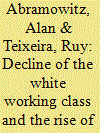

|
|
|
|
|
| Publication |
2009.
|
| Summary/Abstract |
Alan Abramowitz and Ruy Teixeira document the dramatic decline in the white working class and discuss the complicated ways this decline has transformed American politics. They also discuss the emergence of a mass upper-middle class whose effects on American politics may be similarly complicated.
|
|
|
|
|
|
|
|
|
|
|
|
|
|
|
|
| 5 |
ID:
149682
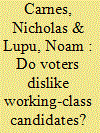

|
|
|
|
|
| Summary/Abstract |
In most democracies, lawmakers tend to be vastly better off than the citizens who elect them. Is that because voters prefer more affluent politicians over leaders from working-class backgrounds? In this article, we report the results of candidate choice experiments embedded in surveys in Britain, the United States, and Argentina. Using conjoint designs, we asked voters in these different contexts to choose between two hypothetical candidates, randomly varying several of the candidates’ personal characteristics, including whether they had worked in blue-collar or white-collar jobs. Contrary to the idea that voters prefer affluent politicians, the voters in our experiments viewed hypothetical candidates from the working class as equally qualified, more relatable, and just as likely to get their votes. Voters do not seem to be behind the shortage of working-class politicians. To the contrary, British, American, and Argentine voters seem perfectly willing to cast their ballots for working-class candidates.
|
|
|
|
|
|
|
|
|
|
|
|
|
|
|
|
| 6 |
ID:
082686
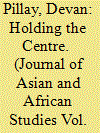

|
|
|
|
|
| Publication |
2008.
|
| Summary/Abstract |
The 2006 South African local election results confirm the approximately two-thirds support the African National Congress (ANC)-led Alliance - with the Congress of SA Trade Unions (COSATU) and the SA Communist Party (SACP) - received from those who voted in previous elections, a level of support that is also consistently reflected among COSATU members in surveys held during 1994, 1998 and 2004.1 However, the low voter turnout means less than a quarter of all eligible voters voted for the ANC. As tensions between the ANC leadership under Thabo Mbeki and its working class allies mounted, this should ordinarily have presented an opportunity to build a Left alternative among a disgruntled working class majority - except that the basis for such an alternative, organized workers, seem resistant to an independent `working class politics'. Instead, they put all their energies into replacing the Mbeki leadership with that of his deputy, Jacob Zuma. By remaining within the Alliance, are the increasingly outspoken COSATU and SACP leadership being constrained by a relatively conservative union membership, arguably one of the beneficiaries of the democratic transition; or are workers merely responding to signals from a (largely compromised) leadership that `working class hegemony' can only be realized through a `popular-democratic' politics within the Alliance
|
|
|
|
|
|
|
|
|
|
|
|
|
|
|
|
| 7 |
ID:
138123
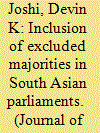

|
|
|
|
|
| Summary/Abstract |
This article provides a new perspective on parliamentary representation in South Asia, focusing on the collective under-representation of population majorities based on the macro-demographic categories of age, class, and gender. Situating this analysis within debates on descriptive representation, it presents the first comparative analysis of the contemporary demographic characteristics of members of parliament (MPs) in Bangladesh, Bhutan, India, Nepal, Pakistan, and Sri Lanka. Highlighting three major gaps in parliamentary representation, it finds quotas, proportional representation electoral systems, and leftist parties to have positively impacted the descriptive representation of South Asian women, the working class, and young adults.
|
|
|
|
|
|
|
|
|
|
|
|
|
|
|
|
| 8 |
ID:
148766
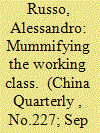

|
|
|
|
|
| Summary/Abstract |
A number of prolonged political experiments in Chinese factories during the Cultural Revolution proved that, despite any alleged “historical” connection between the Communist Party and the “working class,” the role of the workers, lacking a deep political reinvention, was framed by a regime of subordination that was ultimately not dissimilar from that under capitalist command. This paper argues that one key point of Deng Xiaoping's reforms derived from taking these experimental results into account accurately but redirecting them towards the opposite aim, an even more stringent disciplining of wage labour. The outcome so far is a governmental discourse which plays an important role in upholding the term “working class” among the emblems of power, while at the same time nailing the workers to an unconditional obedience. The paper discusses the assumption that, while this stratagem is one factor behind the stabilization of the Chinese Communist Party, it has nonetheless affected the decline of the party systems inherited from the 20th century.
|
|
|
|
|
|
|
|
|
|
|
|
|
|
|
|
| 9 |
ID:
139302
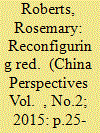

|
|
|
|
|
| Summary/Abstract |
This paper uses a case study of the 2006 TV series remake of the Maoist classic The Red Detachment of Women to examine the way the reproduction of the Red Classics in the reform era has functioned to maintain Party foundation myths that validate and morally legitimise its continued rule while accommodating a major shift in class politics in Chinese society. By tracing the change in the identity of the central hero, Hong Changqing, from working class child labourer and son of an ordinary seaman to a middle class, wealthy, overseas Chinese with family origins in the local gentry, the paper argues that the TV series functions to consolidate the symbiotic relationship between the Party and China’s new middle class, while promoting a consumer lifestyle and consigning the working class to the margins of social and political power.
|
|
|
|
|
|
|
|
|
|
|
|
|
|
|
|
| 10 |
ID:
139300
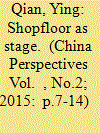

|
|
|
|
|
| Summary/Abstract |
In this paper, I read the play Red Flag Song (1948) as a window into a moment of missed opportunity in China’s revolution, when the Party’s re-engagement with the urban working class could have strengthened democratic tendencies within the Party, and when China’s critical realist literary tradition could have grounded Chinese socialism in the real-life experiences and aspirations of the grassroots. Written at a time when the Party’s control of both industrial and literary productions had begun to tighten, Red Flag Song registered compromise as well as defiance on the shopfloor, and foregrounded two issues as deeply related and fundamental to the making of a New China: work-place democracy as the basis for making China’s working class, and realist literature as a means of understanding complexities and pluralities in social upheavals, and of ensuring a humane and democratic socialism. Unfortunately, the visions Red Flag Song carried were never realised in the following years. They remain unfulfilled promises of the Chinese revolution.
|
|
|
|
|
|
|
|
|
|
|
|
|
|
|
|
| 11 |
ID:
110220
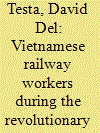

|
|
|
|
|
| Publication |
2011.
|
| Summary/Abstract |
Vietnamese railway workers at the Truòng Thi workshops in colonial Vinh, north-central Vietnam did not join the uprisings against French authority that rocked Nghê An, Hà Tinh and Quang Ngãi provinces in 1930 and 1931. Although the railway workers by then shared a common vocational identity and were unified in seeking improvement of workplace concerns, ethnic, sectarian, regional and status differences among them weakened a common political identity. The heterogeneity of railway workers' attitudes towards political alignment at the time encourages a broader re-examination of the attitudes of participants and observers in the Nghê Tinh Soviets overall.
|
|
|
|
|
|
|
|
|
|
|
|
|
|
|
|
| 12 |
ID:
108006
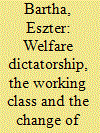

|
|
|
| 13 |
ID:
167647
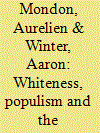

|
|
|
|
|
| Summary/Abstract |
The election of Donald Trump and the Brexit vote were widely hailed as examples of (white) working class revolts. This article examines the populist racialisation of the working class as white and ‘left behind’, and representative of the ‘people’ or ‘demos’, in the campaigns and commentaries. We argue that such constructions made race central, obscured the class make-up, allowed for the re-assertion of white identity as a legitimate political category and legitimised, mainstreamed and normalised racism and the far right. Moreover, it delegitimised Black, Minority Ethnic and immigrant experiences and interests, including working class ones. We show that the construction of the votes as (white) working class revolts, and representing the 'people' and/or 'demos', is based on a partial reading of electoral data, misrepresents the votes, stigmatises the working class, and supports an ideological purpose which maintains the racial, political and economic status quo.
|
|
|
|
|
|
|
|
|
|
|
|
|
|
|
|
| 14 |
ID:
168181
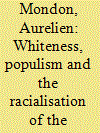

|
|
|
|
|
| Summary/Abstract |
The election of Donald Trump and the Brexit vote were widely hailed as examples of (white) working class revolts. This article examines the populist racialisation of the working class as white and ‘left behind’, and representative of the ‘people’ or ‘demos’, in the campaigns and commentaries. We argue that such constructions made race central, obscured the class make-up, allowed for the re-assertion of white identity as a legitimate political category and legitimised, mainstreamed and normalised racism and the far right. Moreover, it delegitimised Black, Minority Ethnic and immigrant experiences and interests, including working class ones. We show that the construction of the votes as (white) working class revolts, and representing the 'people' and/or 'demos', is based on a partial reading of electoral data, misrepresents the votes, stigmatises the working class, and supports an ideological purpose which maintains the racial, political and economic status quo.
|
|
|
|
|
|
|
|
|
|
|
|
|
|
|
|
|
|
|
|
|